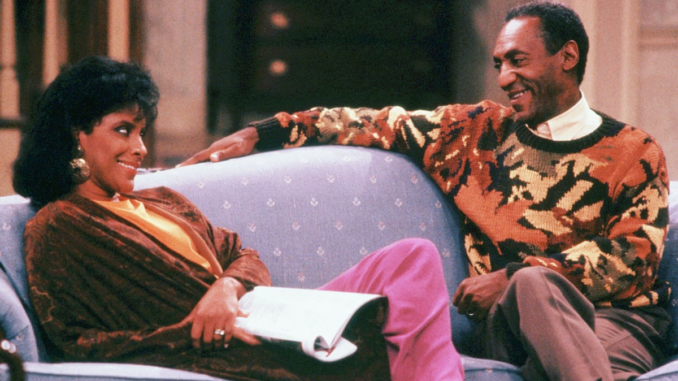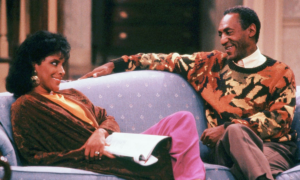
Introduction:
When The Cosby Show first premiered in 1984, television was a very different place. Family sitcoms were often dominated by narratives about struggling, imperfect families. Shows like All in the Family and The Jeffersons presented relatable, often messy family dynamics, but The Cosby Show turned that formula on its head. Bill Cosby’s portrayal of Dr. Cliff Huxtable, a successful, loving, and deeply funny father, quickly became the gold standard for what a TV dad could be. Today, more than three decades after the show’s debut, Cliff Huxtable remains one of the most iconic characters in television history. But how did Cosby’s portrayal of this unique father figure break new ground? And what made Cliff so memorable to viewers of all ages? This article takes a deep dive into how Cliff Huxtable became TV’s most iconic father figure.
Cliff’s Revolutionary Role:
In the 1980s, the television landscape was often steeped in stereotypes about African-American families. Characters were frequently depicted as struggling with economic hardship or facing systemic challenges. However, The Cosby Show presented a refreshing and groundbreaking perspective. Cliff Huxtable was an affluent, educated, and warm-hearted doctor, married to Claire Huxtable (played by Phylicia Rashad), a successful lawyer. Together, they raised five children in an Upper West Side brownstone, where their dynamic was as aspirational as it was relatable.
At the time, African-American families on primetime TV were few and far between, and those that appeared were often shown in roles that reflected societal limitations. Cliff Huxtable, however, was not just a successful professional but a loving, hands-on father, demonstrating how an African-American family could be portrayed as prosperous, nurturing, and high-achieving. This was revolutionary, and the show resonated with millions for the simple reason that it normalized the experience of successful, loving African-American families.
A Different Kind of TV Dad:
Before Cliff, the typical television father was often portrayed as either an inept, bumbling figure or a stern, authoritarian patriarch. Think of characters like Ward Cleaver from Leave It to Beaver, who was often more of an observer than an active participant in his children’s lives, or George Jefferson, whose wealth and bravado often overshadowed his fatherly duties. Cliff Huxtable, on the other hand, was a dynamic and engaging father, one who could be both a disciplinarian and a source of unwavering support. He was funny, but never at the expense of his intelligence or integrity. He delivered comedic lines with impeccable timing, but also offered real wisdom about life, love, and growing up.
One of the defining features of Cliff’s character was his unshakeable bond with his wife, Claire. Their relationship was one of equals—full of mutual respect, shared responsibilities, and deep affection. The couple’s interactions were playful yet grounded, showcasing a partnership that balanced both personal ambition and familial devotion. These moments between Cliff and Claire, often laced with humor, were a key component of the show’s charm.
But it was Cliff’s interactions with his children that truly set him apart. Whether it was guiding Theo through his school struggles or offering Denise advice about life choices, Cliff was a father who was both understanding and firm—qualities that made him stand out in the sitcom world. He was the kind of father you wanted to have, and the kind of father many aspired to be.
The Humor Behind Cliff:
At the heart of the character was Bill Cosby’s incredible comedic timing. Cliff Huxtable wasn’t just a wise and responsible father; he was funny. Cosby’s ability to juggle humor with serious life lessons became a hallmark of the show. Cliff’s humor was never slapstick; it was rooted in witty one-liners, clever observations, and an infectious laugh that made his character feel both real and relatable. His humor was never forced—it flowed naturally from his interactions with his family, often turning everyday situations into hilarious scenarios.
One of the most memorable aspects of Cliff’s character was his ability to speak directly to the camera in a way that felt intimate, like he was letting the audience in on a private joke. Whether he was teasing Claire, mentoring Theo, or just making light of the everyday chaos of family life, Cliff’s humor allowed the audience to connect with him on a personal level. He became not just a character on a television show, but a father figure viewers could look to for guidance and laughter.
Cliff’s Wisdom:
What truly made Cliff Huxtable stand out as a TV dad was his ability to balance humor with wisdom. While many sitcom fathers were limited to providing laughs, Cliff often took on the role of mentor, guiding his children through difficult life lessons. One of the most iconic scenes that highlights this is from the episode “Theo’s Gift,” where Cliff, in a moment of tough love, explains to his son why school is important—not just for grades, but for the future.
Cliff’s wisdom wasn’t just limited to his kids; it extended to how he interacted with Claire, his colleagues, and even his extended family. He often served as the anchor of the family, the one who brought people together during moments of crisis or confusion. His calm demeanor and thoughtful advice were a source of stability in the Huxtable household, and they resonated with audiences who saw his role not just as a source of comic relief but as a guiding light.
A Cultural Icon:
Beyond the screen, Cliff Huxtable became a cultural icon. He was more than just a character on a television show; he represented a shift in how African-American families were portrayed in media. At a time when the portrayal of African-Americans on television was often limited, The Cosby Show proved that audiences were hungry for new, diverse narratives. Cliff Huxtable, as a character, demonstrated the possibilities for African-American families to be shown in a positive light—one that was aspirational but still grounded in reality.
The success of The Cosby Show opened doors for other television programs featuring African-American families, such as Family Matters and The Fresh Prince of Bel-Air. These shows, while unique in their own right, borrowed from The Cosby Show‘s legacy of providing a balanced portrayal of black life. Cliff Huxtable’s character helped set a standard for how black characters—and black fathers—could be portrayed in a realistic and positive way.

The Enduring Legacy:
Today, nearly 40 years after The Cosby Show first aired, the legacy of Cliff Huxtable remains strong. He continues to be one of the most iconic TV fathers, a character whose wisdom, humor, and unwavering love for his family have influenced generations of viewers. While the show’s legacy has been marred by the later controversies surrounding Bill Cosby’s personal life, the character of Cliff Huxtable remains a cultural touchstone. In many ways, Cliff represents the ideal father figure: strong, loving, wise, and always there for his family.
As television continues to evolve, the portrayal of fathers on screen has expanded, but the impact of Cliff Huxtable is undeniable. His legacy endures in the characters of today’s sitcoms and in the hearts of those who grew up watching The Cosby Show. For many, Cliff Huxtable remains the definitive TV dad—one who taught us that a father’s love could be both tough and tender, funny and wise, all at the same time.
Conclusion:
Cliff Huxtable didn’t just change the way fathers were portrayed on television; he became the blueprint for what an ideal father could be. Bill Cosby’s iconic performance continues to inspire, influence, and entertain, ensuring that Cliff Huxtable’s place in TV history is secured. The character’s wisdom, humor, and unyielding love for his family made him more than just a father on TV—he became an icon that continues to resonate with audiences old and new.
